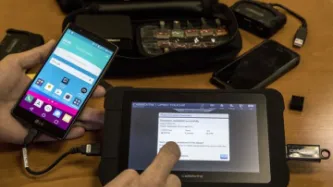Search
Content type: News & Analysis
This op-ed originally appeared in the Huffington Post.
As technologies used by the police race ahead of outdated legislation, we are left vulnerable to potential for misuse and abuse of our data
The vast quantities of data we generate every minute of the day and how it can be exploited is challenging democratic and societal norms. The use by UK police forces of technologies that provide access to data on our phones, which document everything we do, everywhere we go, everyone we interact with…
Content type: Press release
Key points:
Privacy International have today published a report entitled 'Digital Stop and search: how the UK police can secretly download everything from your mobile phone', based on Freedom of Information requests to 47 police forces across the UK about their use of 'mobile phone extraction' technologies, which enable them to download all the content and data from a mobile phone.
Police forces across the UK are secretly downloading data from the smartphones of people across…
Content type: Report
The ‘Digital stop and search’ report examines the use of ‘mobile phone extraction’ tools by the UK police, enabling them to download all of the content and data from people’s phones.
Privacy International have exposed a potentially unlawful regime operating with UK police forces, who are confused about the legal basis for the technology they are using. The police are acting without clear safeguards for the public, and no independent oversight to identify abuse and misuse of sensitive personal…
Content type: Examples
A 2009 paper by the US National Academy of Sciences found that among forensic methods only DNA can reliably and consistency match evidence to specific individuals or sources. While it's commonly understood that techniques such as analysis of blood spatter patterns are up for debate, other types of visual evidence have been more readily accepted. In 2015 the FBI announced that virtually all of its hair analysis testing was scientifically indefensible, and in 2016 the Texas Forensic Science…
Content type: Case Study
Police and security services are increasingly outsourcing intelligence collection to third-party companies which are assigning threat scores and making predictions about who we are.
The rapid expansion of social media, connected devices, street cameras, autonomous cars, and other new technologies has resulted in a parallel boom of tools and software which aim to make sense of the vast amount of data generated from our increased connection. Police and security services see this data as an…
Content type: News & Analysis
As of October 1st, it has become impossible for the public to see footage from North Carolina police body cameras as a result of new law HB 972. This should be of concern to anyone who cares about police accountability and the balance of power in the new digital surveillance era. Increasingly, we are seeing law enforcement use new technology to respond not only to unrest and crime but also to collect and monitor data about individuals who are not suspected of any criminal involvement, such as…






